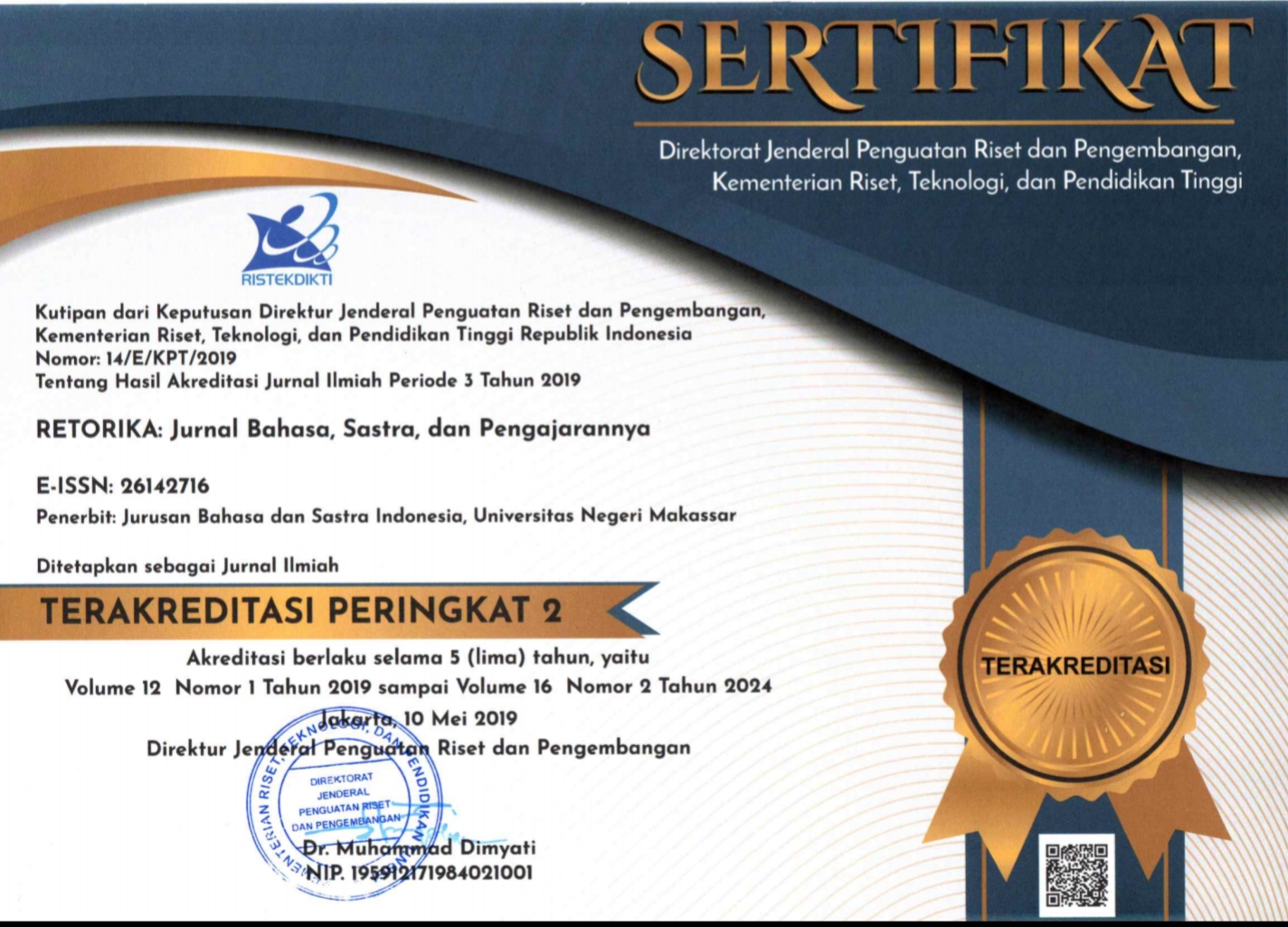THE EXISTENCE OF WOMEN ON THE MURDERER IN FOUR STAG-ES BY MOULY SURYA
(1) Universitas Muhammadiyah Palopo
(2) Indonesian Research Institute for Animal Production
(3) Faculty of Teacher Training and Education, Universitas Cokroaminoto Palopo, South Sulawesi, Indonesia
(4) Faculty of Teacher Training and Education, Universitas Cokroaminoto Palopo, South Sulawesi, Indonesia
(5) Faculty of Teacher Training and Education, Universitas Cokroaminoto Palopo, South Sulawesi, Indonesia
(*) Corresponding Author
DOI: https://doi.org/10.26858/retorika.v14i2.18881
Abstract
This study aims to describe: (1) the treatment of women and (2) the causes of oppression of women, based on the multicultural feminism perspective. This study is qualitative. The data in this study are in the form of text and images of contextual elements containing the existence of women in the form of treatment and causes of oppression of women in the Marlina the Murderer in Four Acts movie. The data was collected through three techniques, namely: documentation technique, listening technique, and transcript technique, and to add the valid data, the researchers used the N-Vivo application by retrieving data from online media, namely news republika, compass, tempo, detik.com, news that discusses the Marlina film. The data results are in the form of images, tables and diagrams, then described by researchers, supported by relevant theories. Then, the data was analyzed by using feminism theory by Simon De Beauvoir and multicultural feminism theory by Audre Lorde. The analysis was done through three phase namely indentification, classification, and data presention. The results of this study indicate: (1) the treatment of women is divided into two, namely: the characteristics of woman feminine and the types of women. The characteristics of women consist of: fear, weakness, patience, kindness, submission, inferiority, alertness, anxiety, hope and imagination. While, the types of women are narcissistic, prostitute, and mystical women. (2) The causes of women's oppression are sexism, racism, classism and ethnicity.
Keywords
Full Text:
PDFReferences
Aldhiyanti, Z. (2020) ‘Kajian Feminisme Terhadap Perempuan dalam Undang-Undang Perka-winan’, Jurnal Global Citizen Jurnal Ilmiah Kajian Pendidikan Kewarganegaraan, 9 (2), 120–129.
Anggreini, H. (2019) ‘Eksistensi Perempuan dalam Novel Drupadi Karya Seno Gumira Ajidarma: Kajian Eksistensialisme Satre’, Jurnal Saweri-gading, 25 (2). doi: Doi. 10.26499/sawer.v25 i2.634.
Asmalasari, D. (2013) ‘Eksistensi Perempuan Tiong-hoa dalam Novel Samita: Bintang Berpijar Di Langit Majapahit Karya Tasaro’, Jurnal Meta-sastra, 6 (1), 1–9.
Basnapal, R. A. (2019) ‘Presentasi Perempuan dalam Perspektif Ekofeminisme pada Movie Marlina Si Pembunuh dalam Empat Babak’, 13 (April). doi: 10.20885/komunikasi.vol13.iss2.art3.
Damadi, H. (2013). Metode Penelitian Pendidikan dan Sosial. Bandung: Alfabeta.
Endraswara, S. (2008). Metodelogi Penelitian Sastra: Epistemologi, Model, Teori, dan Aplikasi. Yogyakarta: FBS UNY.
Fakih, M. (2013). Analisis Gender dan Transformasi Sosial. Yogyakarta: Pustaka Pelajar.
Hall, S. (1997a). Introduction. In S. Hall (Ed.), Representation: Cultural Rpresentations and Signifying Practices, Sage, 1--11.
Klarer, M. (2004). An Introduction to Literaray Stu-dies (second edition). New York: Routledge.
Mustika. (2016). Diskriminasi Terhadap Beberapa Perempuan dalam Perspektif Multikultural: Kajian Terhadap Novel Scappa Per Amore Karya Dini Fitria. Poetika. Vol.IV (1). Doi: 10.22146/poetika.13313
Moleong, L. J. (2017). Metode Penelitian Kualitatif. Bandung: PT. Remaja Rosdakarya.
Nisya, R. K. dan Komalasari, A. D. (2020) 'Eksistensi Perempuan dalam Novel Sempurna Karya Novanka Raja: Kajian Feminisme Eksisten-sialis'. Bahtera Indonesia: Jurnal Penelitian Pendidikan Bahasa dan Sastra Indonesia 5 (2): 165--175.
Pranowo, Y. (2013) 'Identitas Perempuan dalam Budaya Patriarkis: Sebuah Kajian tentang Feminisme Eksistensialis Nawal El Sa' adawi dalam Novel 'Perempuan Di Titik Nol". Jurnal Melintas, 29 (1), 56--78.
Ratih, R. (2019) 'Dinamika Keberadaan Perempuan dalam Puisi-Puisi Indonesia Pasca Orde Baru: Kajian Feminis Eksistensialisme Simone de Beauvoir'. Bahtera: Jurnal Pendidikan, Baha-sa, Sastra, dan Budaya 6 (11): 557--570.
Ratnawati, I. I. (2013) 'Eksistensi Perempuan dalam Novel Aku Lupa Bahwa Aku Perempuan Karya Ihsan Abdul Quddus: Tinjauan Kritik Sastra Feminis'.Jurnal Bahasa, Sastra dan Pembela-jarannya 3 (2), 236--243.
Sari, H. dkk. (2020) 'Analysis of Social and Cultural Values in Ma'parapa (Silence) Text of Rampanan Kapa' Prosesion (Wedding Party) in Tana Toraja'. International Journal of Advanced Science and Technology, 29 (8s), 1718--1724.
Sugiyono. (2012). Metode Penelitian Pendidikan (Pendekatan Kuantitatif, Kualitatif, dan R&D). Bandung: Alfabeta.
Suharto, S. (2015). Kritik Sastra Feminis, Teori dan Aplikasinya. Yogyakarta: Pustaka Pelajar.
Sukmawati, L. (2017). 'Perempuan Sasak dalam Novel Sri Rinjani Karya Eva Nourma: Kajian Feminisme'. Jurnal Haluan Sastra Budaya 1 (2), 177--190.
Thornham, S. (2010). Teori Feminisme dan Cultural Studies. Diterjemahkan oleh Asma Bey Mahyuddin. Yogyakarta: Jalasutra.
Wiranti. (2018). Eksistensi Perempuan dalam Puisi Bride Song karya Christina Rossetti. Leksema: Jurnal Bahasa dan Sastra. 3 (2).
Article Metrics
Abstract view : 447 times | PDF view : 205 timesRefbacks
- There are currently no refbacks.
Copyright (c) 2021 Harmita Sari

This work is licensed under a Creative Commons Attribution-NonCommercial 4.0 International License.
Published by:
Department of Indonesian Language, Faculty of Languages and Literature, Universitas Negeri Makassar in cooperate with Asosiasi Dosen Bahasa dan Sastra Indonesia (ADOBSI) and Ikatan Program Studi Pendidikan Bahasa dan Sastra Indonesia (IKAPROBSI).
Address: Department of Indonesian Language Office, DG Building Second Floor, UNM Parangtambung, Daeng Tata Raya Street, Makassar, South Sulawesi, Indonesia
 Email: [email protected]
Email: [email protected]

RETORIKA: Jurnal Bahasa, Sastra,dan Pengajarannya is licensed under a Creative Commons Attribution-NonCommercial 4.0 International License.
















